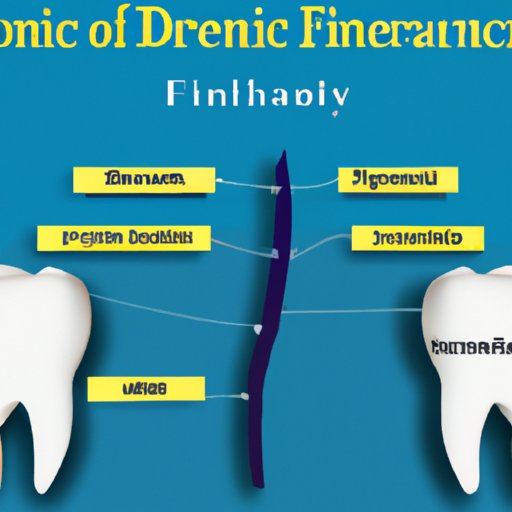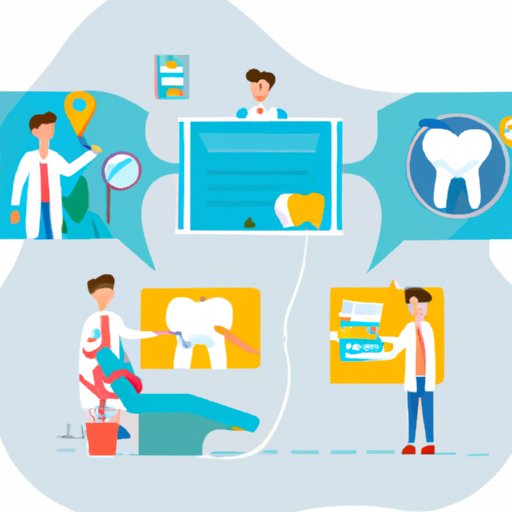Introduction
Dental care can be expensive, especially if you don’t have insurance. Fortunately, there are several ways to get financial help for dental work, including government-funded programs, loans, credit cards, crowdfunding and charitable organizations. In this article, we’ll explore these options in detail and provide advice on how to find affordable dental care.
Exploring Government-Funded Dental Programs for Low-Income Patients
The first place to look for financial help for dental work is your local government. Many states offer low-cost or free dental programs for those who meet certain income requirements. For example, in California, the Denti-Cal program covers basic and emergency dental services for eligible residents. To qualify, you must be a resident of California and meet the program’s income and asset guidelines.
Eligible services may include preventive care (such as cleanings, X-rays and sealants), restorative treatments (like fillings and crowns) and emergency care (including root canals and extractions). Some programs may even cover orthodontic care, such as braces and retainers.
To apply, contact your local public health department or social services office. You may need to provide proof of residency, income and assets, so make sure to have these documents ready when you apply.
How to Find Affordable Dental Care for Those Without Insurance
If you don’t qualify for a government-funded program, there are still ways to get affordable dental care. The first step is to research discount dental plans. These plans allow you to pay a monthly fee in exchange for discounted rates on dental procedures. You can usually find plans that cover preventive care, restorative treatments and even cosmetic dentistry.
Another option is to explore local dental schools. Many dental schools offer low-cost services from student dentists. Services may range from simple cleanings and fillings to more complex procedures like crowns and bridges. You may also be able to find online resources that list free or low-cost clinics in your area.
Evaluating Different Types of Financial Assistance for Dental Work
If you need more extensive dental work and don’t have insurance, you may want to consider financing options. Credit cards, loans and crowdfunding are all viable options for funding dental procedures. Let’s take a closer look at each one.
Credit cards can be a good choice if you need to finance a smaller procedure, such as a cleaning or filling. Most credit cards come with a variety of benefits, such as cashback rewards and 0% introductory APR periods. Just make sure to read the fine print before applying; some cards may have high interest rates and fees, which can add up quickly.
Loans are another option for financing larger procedures, such as crowns or implants. There are several types of loans available, including personal loans and medical loans. Medical loans may have lower interest rates and longer repayment terms than other types of loans, making them a more attractive option.
Finally, crowdfunding sites like GoFundMe and YouCaring are becoming increasingly popular for funding medical and dental procedures. With crowdfunding, you can set up a page to solicit donations from friends, family and strangers. However, it’s important to keep in mind that there are no guarantees you’ll reach your fundraising goal.

Understanding the Impact of Financing Options on Your Dental Health
When considering a financing option for dental work, it’s important to understand the potential impact on your dental health. Interest rates and fees can add up quickly, so make sure you understand the full cost of the loan or credit card before signing up. Also, be aware that some financing options may require monthly payments, which could put a strain on your budget.
Comparing Benefits and Costs of Dental Loans vs. Credit Cards
Dental loans and credit cards both offer advantages and disadvantages. Loan amounts and terms vary depending on the lender, but most offer higher limits than credit cards. For example, some lenders may offer loans up to $50,000 with repayment terms of up to 10 years. On the other hand, credit cards typically have lower limits and shorter repayment periods. However, many cards offer rewards and cashback bonuses, so it pays to shop around for the best deal.

Examining the Pros and Cons of Crowdfunding for Dental Procedures
Crowdfunding can be a great way to fund dental procedures, but it’s important to understand the potential risks. Platforms like GoFundMe and YouCaring are easy to set up, but success is not guaranteed. Even if you reach your fundraising goal, there’s no guarantee you’ll receive the funds in time to pay for the procedure. Additionally, some platforms may charge fees or take a percentage of the donations.

Researching Charitable Organizations Offering Dental Care Services
Finally, there are several charitable organizations that offer free or low-cost dental care. These organizations typically focus on providing care to underserved communities, such as low-income families, veterans and seniors. To find a charity near you, search online for “free dental care” or “low-cost dental care.”
Keep in mind that availability of services varies by location and some charities may have waiting lists or eligibility requirements. Be sure to call ahead to ensure the organization offers the type of care you need and to confirm eligibility.
Conclusion
Finding financial help for dental work can be a daunting task, especially if you don’t have insurance. Fortunately, there are several options available, including government-funded programs, loans, credit cards, crowdfunding and charitable organizations. Each option has its own benefits and drawbacks, so it’s important to do your research and compare costs before making a decision.
For those without insurance, researching discount dental plans and exploring local dental schools can be a great way to find affordable care. And for those who need more extensive work, financing options like loans and credit cards may be the best bet. Finally, for those who don’t qualify for any of these options, charitable organizations can provide much-needed relief.
No matter what your situation, there is likely a financial solution for your dental needs. With a little bit of research and patience, you can find the help you need to get the care you deserve.
(Note: Is this article not meeting your expectations? Do you have knowledge or insights to share? Unlock new opportunities and expand your reach by joining our authors team. Click Registration to join us and share your expertise with our readers.)
